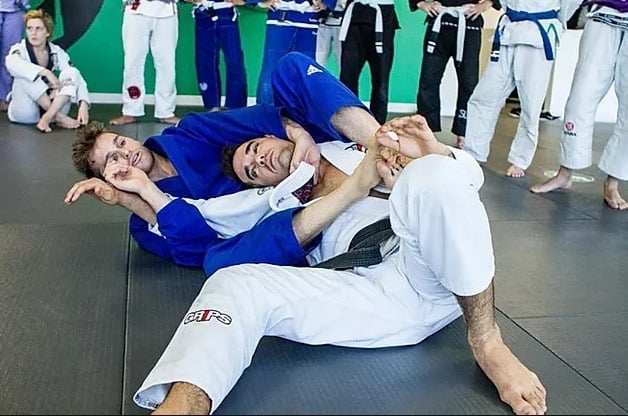
When is the last time you tapped in training? If you haven’t tapped for more than a week, you’re doing something wrong. Getting tapped out is the single best thing that can happen to you in a roll. The more you do it the more you learn. This is something we’ve talked about and everyone keeps on saying it. But what exactly do you learn when you tap? When a submission is too painful to resist? Or how much you suck at Jiu-Jitsu? Neither. Tapping out is the perfect way to actually learn BJJ escapes.
There’s an art more subtle within the realm of Brazilian Jiu-Jitsu than escapes. No matter how you look at things, BJJ escapes are the measure of a great grappler. Anyone can hunt for submissions or do weird lapel stuff and stay in positions for indefinite amounts of time. The true high-level grapplers are those that can get out of anything and make it seem like your attacks are useless. But how did they get like that? Easy – they tapped out. A lot.
The Hardest Thing To Do In Jiu-Jitsu
The single hardest thing to get used to doing in Jiu-Jitsu is tapping out. And no, it doesn’t get easier with time. On the contrary, there’s no one better at tapping out than white belts. Okay, maybe blue belts right before they discover that they can turtle up and be highly annoying. Jokes aside, tapping out is a skill that gets harder with time. It goes completely against human nature, but in order to become great at Jiu-Jitsu, you’ll need to embrace it.

All that stuff about submitting your ego and becoming a tapping machine is senseless. We can be aware that we shouldn’t let our egos interfere, but that doesn’t mean we’ve let them at the door. It’s impossible, it is misleading and does more damage than good. Instead, people should learn that getting tapped out is as inevitable as the sun setting. So, as much as you might hate the dark, you learn to live in it, and even better, thrive in it. The same holds true for your ego and tapping out.
The Value Of Getting Tapped Out Regularly
So, how exactly does tapping out help you Jiu-Jitsu? Let’s go belt by belt and try to pinpoint the exact benefits you get from tapping out. As a beginner, it is easy – tapping out is like a safety word. The moment you do it, you’re safe. The trouble is, you’re probably using it too often a completely out of context. That’s fine – that’s where the lesson is. Knowing that you can train something as crazy as Jiu-Jitsu full speed every day of the week and be completely safe is the best thing tapping out can teach you at this point.
At a blue belt, you’ll have your first real inner conflict about tapping out. It is still okay with higher belts, but god forbid you to tap out to a white belt or even fellow blue belts. At this point, tapping out will teach you that no defense is going to work universally. The second huge conflict, probably the greatest one comes at purple belt. Here, getting regularly tapped out is going to be the toughest to swallow. Conversely, the lesson is also a hugely important one – you take it so personally that you throw yourself at perfecting your game so that you don’t end up in the same station again, even though it is inevitable.
At brown belt, you’ll actually accept that you can’t learn BJJ without getting tapped out. That’s also where you realize that you simply have to add BJJ escapes to your game. And not just add them but thrive in them. Tapping out is what gets you to this huge hallmark in your understanding of JIu-Jitsu. Finally, at black belt, tapping out is about two things – perfecting BJJ escapes, and getting reminded that you’ll always be a “white belt” compared to someone else. The more black belts there are out there, the more important this becomes.
Suffer To Learn BJJ

Simply put, there are two ends to the spectrum of BJJ escapes – early and late escapes. Those are the two you want to focus on. Everything in the middle is mediocre and is what people are usually looking at. That said, late defenses, particularly very, very late ones are an art form of themselves. In order to really understand them, you’ll have to go deep into bad spots, meaning you’ll have to have a lot of taps ready to go. Only by getting tapped out constantly as you work on your timing, feeling, positioning, etc., will you have any measurable success with BJJ escapes.
If you don’t want to take my word for it, check out Priit’s work. So far he has several DVD instructionals that cover the subtle art of escaping and evading. His “Grilled Chicken Guard System” is a great place to start, along with his “Protecting And Generating Dynamic Offense From The Turtle” DVD. However, his masterpiece (at least so far) that I highly recommend you check out is the “The Sitting Turtle” DVD instructional.
Wrap Up
The trouble with BJJ escapes is that you can’t really learn them from someone else. You can become aware of certain universal principles and concepts, but ultimately, you’ll have to suffer and get tapped out to actually learn. Speaking of which, that’s not going to happen by itself, so you better get to work and pack a lot of taps for your next BJJ class. You’ll need them, regardless of your belt level.


![Darce Choke Encyclopedia – Origins, Mechanics and Variations [2025] BJJ, choke, Brabo, BJJ Darce Choke, D'arce Choke, Darce BJJ Choke](https://bjj-world.com/wp-content/uploads/2017/11/JungPoirierLeeYahoo-218x150.jpg)









![X-Guard Trickery Kyle Sleeman DVD Review [2025] X-Guard Trickery Kyle Sleeman DVD Review](https://bjj-world.com/wp-content/uploads/2025/03/x-guard-trickery-kyle-sleeman-dvd-review-218x150.png)
![Countering with Crab Ride Anthony Budion DVD Review [2025] Countering with Crab Ride Anthony Budion DVD Review](https://bjj-world.com/wp-content/uploads/2025/03/countering-with-crab-ride-anthony-budion-dvd-review-218x150.png)
![Closet Closed Guard Craig Jones DVD Review [2025] Closet Closed Guard Craig Jones DVD Review](https://bjj-world.com/wp-content/uploads/2025/03/closet-closed-guard-craig-jones-dvd-review-218x150.png)
![Xanadu Back Takes Levi Jones-Leary DVD Review [2025] Xanadu Back Takes Levi Jones-Leary DVD Review](https://bjj-world.com/wp-content/uploads/2025/03/xanadu-back-takes-levi-jones-leary-dvd-review-218x150.png)

![No-Gi Grapplers Guide To Front Headlock Joel Bane DVD Review [2025] No-Gi Grapplers Guide To Front Headlock Joel Bane DVD Review](https://bjj-world.com/wp-content/uploads/2025/03/no-gi-front-headlock-joel-bane-dvd-review-218x150.png)



![The Empty Half Guard Michael Currier DVD Review [2025] The Empty Half Guard Michael Currier DVD Review](https://bjj-world.com/wp-content/uploads/2025/03/empty-half-guard-michael-currier-dvd-review-100x70.png)
![Master The Move Anaconda Strangle John Danaher DVD Review [2025] Master The Move Anaconda Strangle John Danaher DVD Review](https://bjj-world.com/wp-content/uploads/2025/02/anaconda-strangle-john-danaher-dvd-review-100x70.png)
![Closed Guard Reintroduced Adam Wardzinski DVD Review [2025] Closed Guard Reintroduced Adam Wardzinski DVD Review](https://bjj-world.com/wp-content/uploads/2025/01/closed-guard-reintroduced-adam-wardzinski-dvd-review-100x70.png)
![Dima Murovanni Kill The Collar Tie BJJ Trendsetters DVD Review [2024] Dima Murovanni Kill The Collar Tie BJJ Trendsetters DVD Review](https://bjj-world.com/wp-content/uploads/2024/09/dima-murovanni-kill-the-collar-tie-dvd-review-100x70.png)
![360 Degrees Guard Retention Thiago Abud DVD Review [2024] 360 Degrees Guard Retention Thiago Abud DVD Review](https://bjj-world.com/wp-content/uploads/2024/10/360-degrees-guard-retention-thiago-abud-dvd-review-100x70.png)


![EMU Guard 2.0 Benjamin Power DVD Review [2024] EMU Guard 2.0 Benjamin Power DVD Review](https://bjj-world.com/wp-content/uploads/2024/11/emu-guard-2-0-benjamin-power-dvd-review-100x70.png)
![Mastering Takedown Prevention Steve Mocco DVD Review [2024] Mastering Takedown Prevention Steve Mocco DVD Review](https://bjj-world.com/wp-content/uploads/2024/11/mastering-takedown-prevention-steve-mocco-dvd-review-100x70.png)
![Ginastica Natural Alvaro Romano DVD Review [2024] Ginastica Natural Alvaro Romano DVD Review](https://bjj-world.com/wp-content/uploads/2024/12/ginastica-natural-alvaro-romano-dvd-review-100x70.png)





![The Bear Trap Nicolas Renier DVD Review [2025] The Bear Trap Nicolas Renier DVD Review](https://bjj-world.com/wp-content/uploads/2025/01/the-bear-trap-nicolas-renier-dvd-review-100x70.png)

![Don’t Stand Up Chris Wojcik DVD Review [2024] Don't Stand Up Chris Wojcik DVD Review](https://bjj-world.com/wp-content/uploads/2024/11/dont-stand-up-chris-wojcik-dvd-review-100x70.png)
![Advanced Chin Control Concepts David Petrone DVD Review [2025] Advanced Chin Control Concepts David Petrone DVD Review](https://bjj-world.com/wp-content/uploads/2025/01/chin-control-concepts-david-petrone-dvd-review-100x70.png)
![Tricks for Unstoppable Takedowns Georges St Pierre DVD Review [2024] Tricks for Unstoppable Takedowns Georges St Pierre DVD Review](https://bjj-world.com/wp-content/uploads/2024/12/unstoppable-takedowns-georges-st-pierre-dvd-review-100x70.png)
![Dynamic De La Riva Guard Otavio Sousa DVD Review [2025] Dynamic De La Riva Guard Otavio Sousa DVD Review](https://bjj-world.com/wp-content/uploads/2025/02/dynamic-de-la-riva-guard-otavio-sousa-dvd-review-100x70.png)


![Upper Body Chain Attacks Janine Mocaiber DVD Review [2025] Upper Body Chain Attacks Janine Mocaiber DVD Review](https://bjj-world.com/wp-content/uploads/2025/03/upper-body-chain-attacks-janine-mocaiber-dvd-review-100x70.png)
![Weight Training For Grappling Michael Israetel DVD Review [2025] Weight Training For Grappling Michael Israetel DVD Review](https://bjj-world.com/wp-content/uploads/2025/01/weight-training-for-grappling-michael-israetel-dvd-review-100x70.png)